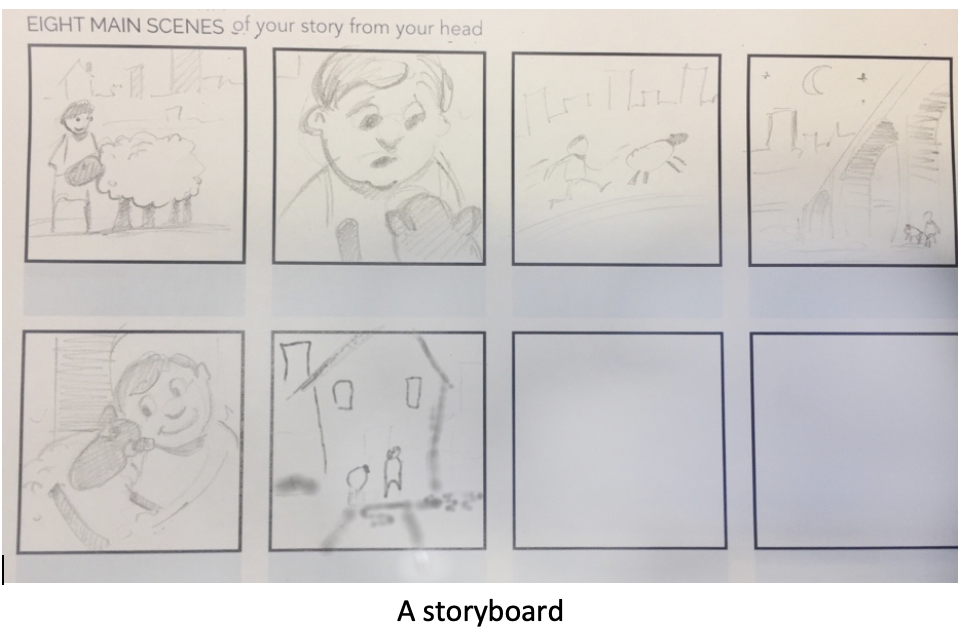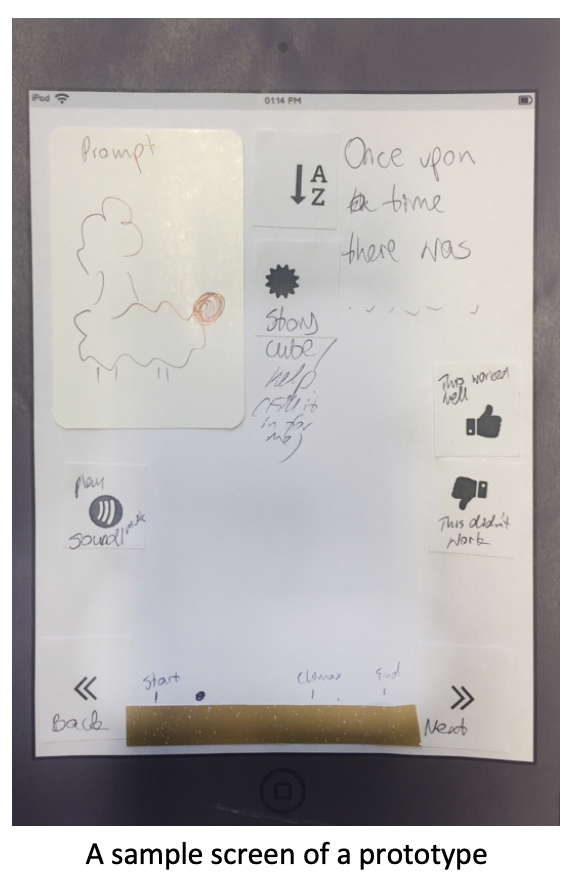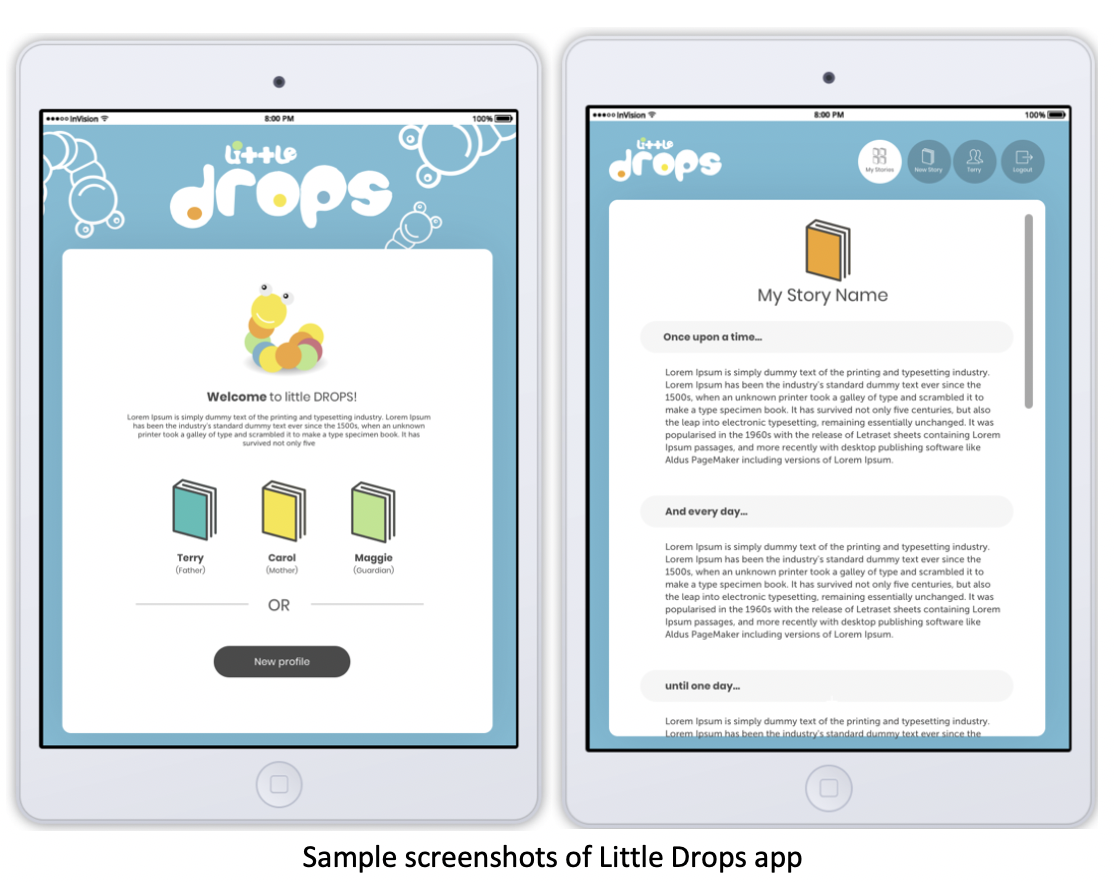‘Tell me a story from your head!’ – working with parents to design an app to help spark ideas
By Blog Editor, IOE Digital, on 1 May 2020
Parents and children have been telling each other stories from time immemorial. In the extraordinary days we are living through, storytelling could take on increased importance, as families spend more time at home together seeking ways to make sense of this strange new world.
Studies have found that storytelling is embedded in family life from toddlerhood into adulthood. It strengthens the way children and parents jointly understand their culture and identities while introducing children to concrete and abstract concepts, relationships and information. In school it supports children’s verbal and listening skills, active participation and cooperation, imagination and creativity.
In the DROPS project our UCL team is designing a tablet-based app supporting oral storytelling between parents and children.
We began by investigating the way parents and children share storytelling and reading at home. We observed the physical closeness of the parent-child pair and the way parents encouraged the child’s engagement in the story. Though parents generally valued these ‘bonding’ opportunities, they often found it difficult to reconcile them with their busy everyday lives. This led us to formulate a design challenge: How might we help busy and tired parents take on the role of a caring and entertaining storyteller in an intimate space?
Grounded in this design challenge, we ran an ideation workshop to generate creative ideas around this theme. Amongst the different ideas that were proposed was a template for helping parents with improvising tales on the spot when their children make the classic request: “Tell me a story from your head!” This idea moved us away from books to recognise the prevalence, cultural importance and inclusivity of oral storytelling. So we hosted a co-design prototyping workshop between designers and parents in order to understand how technology might support this practice.
Prototyping for oral storytelling
Prototyping is an essential step in any user-centred design process, as it allows designers to render their ideas from abstract into something more tangible in order not only to communicate them, but to also test and modify them in collaboration with users.
Our prototyping workshop included four designers and four parents of five to seven-year-olds. We started by asking designers to interview parents about their storytelling experiences. This helped us collect information on existing practices as well as to set the tone and provide some data for the upcoming activities.
We then grouped the participants into two teams of four and asked each team to come up with a “story from their head”, captured and presented in a visual format using a storyboard template. The aim was for the participants to imagine how potential users of their prototype would improvise a story from scratch. It also enabled us to document the different types of stories the parents might be telling their children. The figure below illustrates a story one of the teams crafted together of a lost sheep that was adopted by a little boy as a pet.

Next, the teams used journey map templates in order to recognise any processes they might currently be following in coming up with their own stories, and to identify possible opportunity moments or points of tension to be resolved when later designing their prototypes.

Whereas the first three activities were designed to capture parents’ current experience of oral storytelling without the use of technology, the next activity aimed to imagine how digital technology – such as a mobile application – might help them with improvising and telling oral stories.
Participants brainstormed digital solutions that could help parents in creating, sharing and perhaps re-telling oral stories in the future. Each team was provided with blank smartphone or tablet templates along with optional printed icons and ‘buttons’ to sketch their prototypes. Participants then ‘built’ their prototypes iteratively until each team arrived at a final version. These were discussed and reflected upon.

Key Insights
Our analysis of the sessions isolated the following key insights that can motivate and inform digital design for oral storytelling:
- Improvisational aids: Use of ‘prompts’ or sensory stimuli (such as pictures or words) can help inspire one’s memory in coming up with a story subject, characters, events and so on. Additionally, story templates can serve as scaffolds or guidelines for the placement of various elements to make a meaningful and effective story.
- Flexible design: One size doesn’t fit all! People have different levels and types of creativity. While some parents might need many prompts and improvisational aids, others might prefer a less intrusive experience in which they make up their own stories with few or no prompts and templates.
- Minimalist design: Simple design allows for a seamless and uninterrupted experience with technology, which is key considering the often impromptu and spontaneous nature of oral storytelling.
- Co-creation: Children’s active participation, from collecting prompts all the way to the actual creation and telling of the story, can enhance parents’ inspiration and creativity.
At the moment, these insights, or design principles, are guiding the design of Little Drops, our app prototype for parents’ oral storytelling. We recently took part in the HackFromHome virtual hackathon where our design concept was amongst the few ideas deemed relevant to the event’s stated objective of “making a difference against COVID-19”. In collaboration with front-end developers who joined our project during this event, we were able to code a few of the prototype’s screens. Here’s a sneak peek:

Once the prototype is ready, we will evaluate it in the wild with some families. Keep an eye out for more information shared on this space! Alternatively, if you have children between the ages of 5 and 7 and are interested in participating in our project, please email us at s.kalantari@ucl.ac.uk. We would love for you to test our prototype and share your feedback with us.
Sara Kalantari is a member of the DROPS team and a research and design fellow at UCL Knowledge Lab. The DROPS project investigates the technology, business, economic and legal models of personalisation in a decentralised data economy. It will create several open-sourced artefacts and technologies on the HAT platform feeding into the live HAT ecosystem. Find out more at: www.hat-lab.org
 Close
Close



